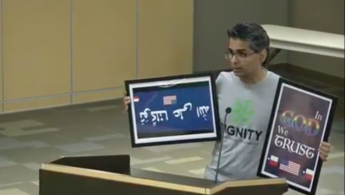Texas school board rejects 'In God We Trust' Arabic signs
A school board in Texas has rejected signs reading 'In God We Trust' in Arabic following backlash to a new state law requiring schools to display donated signs.
Under the new law schools and universities must display a poster or a framed copy of the words "In God We Trust" - the national motto, most commonly associated with US dollar bills - in a conspicuous place if it has been donated or purchased from private donations.
The law, which was introduced in February, was passed in June with 31 Republican (and no Democratic) sponsors.
Its summary reads: "Relating to the display of the national motto in public schools and institutions of higher education".
The lack of detail in the law has given activists an opening to protest it by organising campaigns to donate signs in different languages - including Arabic, Spanish and even Vulcan - and different designs, including the rainbow Pride flag.
This week, the board at the Carroll Independent School District in north Texas rejected the offers of new signs, saying they already had enough.
"I am here today to present, in accordance with SB [Senate Bill] 797, the In God We Trust, posters to the schools. I would like to request you to come and accept it. Would you like to come and accept it? I'm here to donate these signs in accordance with SB797," said Sravan Krishna, a local resident, at a session earlier this week.
A board member responded by saying there were already sufficient signs at all 11 campuses, and they would not want to overwhelm the schools with donations. He then asked for the next speaker to come forward.
"No, I'm not leaving," said Krishna, gesturing to the clock counting down his three minutes of allotted time to speak. "So, it doesn't say you have to stop at one. That is your decision to stop at one. Why is more God not good? And are you saying you don't have like one square feet of space in our buildings?"
The same board member again tried to wrap up Krishna's speech by thanking him for his donated signs.
Krishna continued: "Then you can be quiet, and you can let me finish my speech for the rest of the one minute. So, this is also our national motto, so I think it's kind of un-American to reject posters of our national motto as well."
He added: "Some of you geniuses are saying, 'Oh, it's in currency.' How can you say no to money? So, I mean, more money's good, right? So, you guys wouldn't, you know, reject more money because it has our motto, too, right? So, I will just display the other posters for the rest of my time."
As he was speaking, Krishna held an Arabic (literally translated) "In God We Trust" sign upside down in one hand, while holding another "In God We Trust" sign with a rainbow spelling out God and with two Texas state flags and an American flag, all the while keeping a straight face.
This protest against the new Texas law is the latest in a state that often finds itself in the news for attempting to bring Christianity into the public sphere, perhaps most controversially in schools.
This includes the teaching of abstinence instead of reproductive health, as well as ongoing debates over including biblical creationism in science classes. In August, a Texas school district ended up banning the bible as it was trying to purge books with explicit content.
Many argue that this new law requiring "In God We Trust" signs in schools goes against the country’s implicit constitutional First Amendment right to the separation between church and state.
The most high-profile campaign against the new law was launched in August by Chaz Stevens, an activist from Boca Raton, Florida whose GoFundMe campaign has gathered nearly $50,000 out of its $250,000 goal as of Thursday afternoon. Donations have been pouring in from across the US, many from Texans who disagree with their state's recent policy.
"As a good Christian I support spreading the word of God everywhere and in every language. Leaders of faith, this is your calling!" wrote Peter Robinson, who gave $5.
"It's long past time to pull Texas forward from the 1800s, where our politicians want to keep us. Thank you for this contribution to the work," wrote Christ Schulman, who gave $50.





 Follow the Middle East's top stories in English at The New Arab on Google News
Follow the Middle East's top stories in English at The New Arab on Google News


